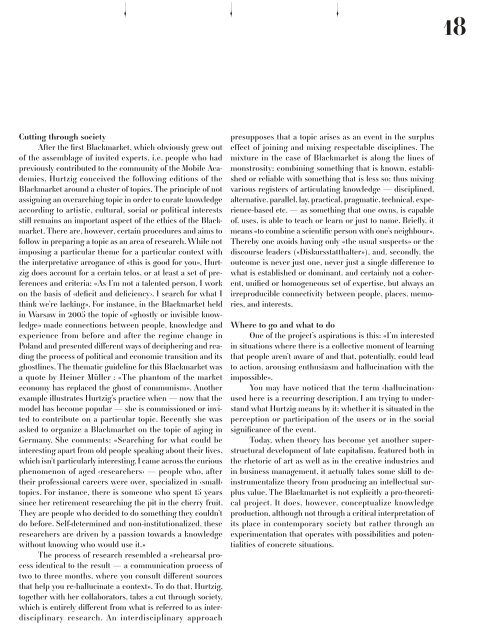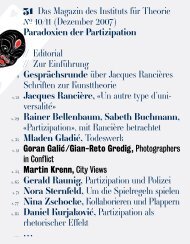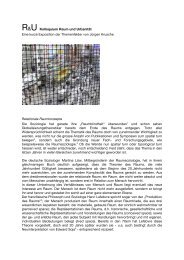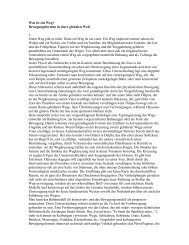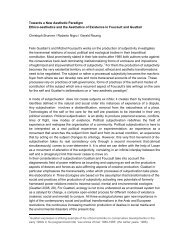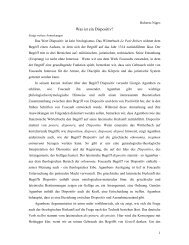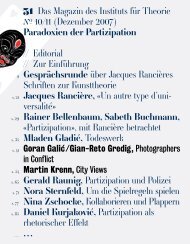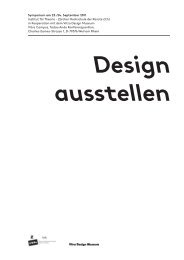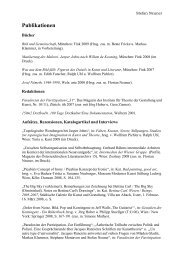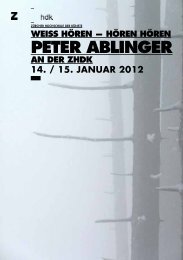PDF des gesamten Heftes (5MB) - Institut für Theorie ith
PDF des gesamten Heftes (5MB) - Institut für Theorie ith
PDF des gesamten Heftes (5MB) - Institut für Theorie ith
Sie wollen auch ein ePaper? Erhöhen Sie die Reichweite Ihrer Titel.
YUMPU macht aus Druck-PDFs automatisch weboptimierte ePaper, die Google liebt.
_–<br />
_–<br />
_–<br />
18<br />
Cutting through society<br />
After the first Blackmarket, which obviously grew out<br />
of the assemblage of invited experts, i.e. people who had<br />
previously contributed to the community of the Mobile Academies,<br />
Hurtzig conceived the following editions of the<br />
Blackmarket around a cluster of topics. The principle of not<br />
assigning an overarching topic in order to curate knowledge<br />
according to artistic, cultural, social or political interests<br />
still remains an important aspect of the ethics of the Blackmarket.<br />
There are, however, certain procedures and aims to<br />
follow in preparing a topic as an area of research. While not<br />
imposing a particular theme for a particular context w<strong>ith</strong><br />
the interpretative arrogance of «this is good for you», Hurtzig<br />
does account for a certain telos, or at least a set of preferences<br />
and criteria: «As I’m not a talented person, I work<br />
on the basis of ‹deficit and deficiency›. I search for what I<br />
think we’re lacking». For instance, in the Blackmarket held<br />
in Warsaw in 2005 the topic of «ghostly or invisible knowledge»<br />
made connections between people, knowledge and<br />
experience from before and after the regime change in<br />
Poland and presented different ways of deciphering and reading<br />
the process of political and economic transition and its<br />
ghostlines. The thematic guideline for this Blackmarket was<br />
a quote by Heiner Müller : «The phantom of the market<br />
economy has replaced the ghost of communism». Another<br />
example illustrates Hurtzig’s practice when — now that the<br />
model has become popular — she is commissioned or invited<br />
to contribute on a particular topic. Recently she was<br />
asked to organize a Blackmarket on the topic of aging in<br />
Germany. She comments: «Searching for what could be<br />
interesting apart from old people speaking about their lives,<br />
which isn’t particularly interesting, I came across the curious<br />
phenomenon of aged ‹researchers› — people who, after<br />
their professional careers were over, specialized in ‹small›<br />
topics. For instance, there is someone who spent 15 years<br />
since her retirement researching the pit in the cherry fruit.<br />
They are people who decided to do something they couldn’t<br />
do before. Self-determined and non-institutionalized, these<br />
researchers are driven by a passion towards a knowledge<br />
w<strong>ith</strong>out knowing who would use it.»<br />
The process of research resembled a «rehearsal process<br />
identical to the result — a communication process of<br />
two to three months, where you consult different sources<br />
that help you re-hallucinate a context». To do that, Hurtzig,<br />
together w<strong>ith</strong> her collaborators, takes a cut through society,<br />
which is entirely different from what is referred to as interdisciplinary<br />
research. An interdisciplinary approach<br />
presupposes that a topic arises as an event in the surplus<br />
effect of joining and mixing respectable disciplines. The<br />
mixture in the case of Blackmarket is along the lines of<br />
monstrosity: combining something that is known, established<br />
or reliable w<strong>ith</strong> something that is less so; thus mixing<br />
various registers of articulating knowledge — disciplined,<br />
alternative, parallel, lay, practical, pragmatic, technical, experience-based<br />
etc. — as something that one owns, is capable<br />
of, uses, is able to teach or learn or just to name. Briefly, it<br />
means «to combine a scientific person w<strong>ith</strong> one’s neighbour».<br />
Thereby one avoids having only «the usual suspects» or the<br />
discourse leaders («Diskursstatthalter»), and, secondly, the<br />
outcome is never just one, never just a single difference to<br />
what is established or dominant, and certainly not a coherent,<br />
unified or homogeneous set of expertise, but always an<br />
irreproducible connectivity between people, places, memories,<br />
and interests.<br />
Where to go and what to do<br />
One of the project’s aspirations is this: «I’m interested<br />
in situations where there is a collective moment of learning<br />
that people aren’t aware of and that, potentially, could lead<br />
to action, arousing enthusiasm and hallucination w<strong>ith</strong> the<br />
impossible».<br />
You may have noticed that the term ‹hallucination›<br />
used here is a recurring <strong>des</strong>cription. I am trying to understand<br />
what Hurtzig means by it: whether it is situated in the<br />
perception or participation of the users or in the social<br />
significance of the event.<br />
Today, when theory has become yet another superstructural<br />
development of late capitalism, featured both in<br />
the rhetoric of art as well as in the creative industries and<br />
in business management, it actually takes some skill to deinstrumentalize<br />
theory from producing an intellectual surplus<br />
value. The Blackmarket is not explicitly a pro-theoretical<br />
project. It does, however, conceptualize knowledge<br />
production, although not through a critical interpretation of<br />
its place in contemporary society but rather through an<br />
experimentation that operates w<strong>ith</strong> possibilities and potentialities<br />
of concrete situations.


